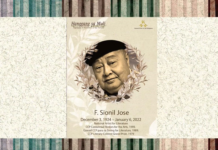THE UNIVERSITY has issued stricter guidelines on sexual harassment cases, setting procedures for complaints and establishing a committee to deal with such matters.
In a six-page document obtained by the Varsitarian, UST listed 12 forms of sexual harassment, on top of the acts listed under the Safe Spaces Act which was signed into law in 2019.
The law considers the following as acts of “gender-based sexual harassment”: catcalling, cyberstalking, gender-based online sexual harassment, homophobic remarks or slurs, misogynistic remarks or slurs, sexist remarks or slurs, transphobic remarks or slurs, and stalking.
The University’s guidelines added the following as forms of sexual harassment:
- persistent “green” jokes;
- taunting an employee or student with sexual innuendos;
- displaying offensive pictures or publications;
- asking about a person’s sexual activities or preferences;
- making offensive hand or body gestures;
- sending obscene messages through electronic devices during or outside working hours;
- “Chancing”;
- unnecessary brushing up against the body;
- pinching of buttocks;
- touching a person’s sensitive parts;
- threat of sexual assault or rape; and
- other acts of similar nature.
“[UST] values and respects the dignity and rights of its employees and students […] and is committed to keep its work and education environment free from gender-based sexual harassment and all forms of sexual intimidation and exploitation,” the policy statement, signed by UST Rector Fr. Richard Ang, O.P., stated.
The guidelines cover sexual harassment acts committed inside or outside the campus, at school or training or education related-functions, in the course of work assignments or course assignments outside the campus, and during work- and training-related activities such as conferences, seminars, studies, sessions, and travel.
How are complaints filed?
If the perpetrator of the act is a student, the complaint must be filed with the college-level Student Welfare and Development Committee (SWDC) or the Office for Student Affairs. The majority of the members of the investigating panel must be women, if not, the OSA director may appoint a female to oversee the case.
A Committee on Decorum and Investigation (CODI) will be in charge of cases wherein the perpetrator is an employee, faculty member, or official of UST.
The CODI will be composed of a female representative of the vice rector who will serve as the chairperson, an official appointed by the vice rector, a faculty or labor union representative if the perpetrator is a faculty member or a support staff member, and a Central Student Council representative and another UST official if the complainant is a student.
All cases must be investigated and decided on within 10 days after the complaint is received.
Complaints filed to the CODI should include the full name and designation of both the complainant and the respondent, a specific charge sufficient to constitute the offense, and a brief statement of relevant facts with particulars as to date, time and place, persons present, and other circumstances.
The decisions of the CODI will be deemed final and executory, unless the respondent obtains a stay order from the Office of the Rector within 10 days from the receipt of the decision.
The chair of the CODI may place respondents under 30-day preventive suspensions if their continued employment “poses a serious and imminent threat to the life or property of UST, its employees and/or student/s.”
Penalties include dismissal, suspension for a maximum period of one year, and reprimand, taking into account the seriousness of the offense in light of the facts and circumstances of the case.
The CODI’s investigation will be kept “under the strictest confidence.”
“It is the intention of UST that rights of the parties, especially the innocent ones, are protected. At the same time, however, dignity and honor shall be preserved for all the parties concerned by keeping all information gathered through the investigation process confidential at all times, even after the conclusion of the investigation proper,” the guidelines read.
The Safe Spaces Act, which served as the basis for the guidelines, promotes “policy change, behavioral change, and cultural change,” according to Sen. Risa Hontiveros, the act’s principal author and sponsor in the Senate.





















